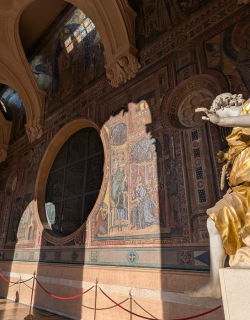In 27 BC, the Roman Senate, broken and cowed after a generation of bloody civil war, met to vote on how best to honor the man who had brought peace and stability back to their Republic. It was a paradoxical gesture, for the cost of this new “golden age” was their democracy itself: from now on, Rome and its empire would be ruled by a single unelected leader.
At first they tried to placate him and offered him symbols that might hint at what he really was: a crown, a sceptre, and the right to wear a special purple toga. These were the ancient markers of kingship, but this new ruler did not want to be king - or at least had no desire to cultivate the image of despotism. He refused these gestures, so, in commemoration of this “modesty”, the senators instead ordered that a golden shield be set up in the Senate House inscribed with the qualities that they thought (or hoped) this man embodied: virtue, piety, clemency, and justice.
In the end, their new ruler accepted two tokens that were, while less obviously monarchical, equally laden with meaning. The first was the right to display above the door of his house the corona civica, the oak-leaf crown, a traditional honor given to Roman soldiers who had saved the life of a fellow citizen (for hadn’t this man, although not himself a soldier, saved the lives of the entire Republic?), and to grow laurel trees, the symbol of victory, on either side of his threshold. The second honor was seemingly simpler but ultimately more lasting: a new name. From that point, Rome’s first emperor would be known not by his birth-name or his adopted name but instead as Augustus.
The Name of the Son: Gaius Octavius
Rome’s future emperor, the man who would rule the Mediterranean world from Portugal to Syria, was not born into power. His father, Gaius Octavius, was a minor noble from one of the small towns outside of Rome. Although very wealthy, his family had never had the means or ambition to enter the Senate, the highest social class of Republican Rome. Octavius was the first of his line to break into this club, and proved so adept that in 60 BC he was appointed governor of Macedonia. He died of an illness on his way back to Rome, where he was hoping to stand for election to the consulship, Rome’s highest office.
He left behind several children, including a four-year-old son who was also named, after his father, Gaius Octavius - in English we call him Octavian. This young boy grew up surrounded by wealth but lacking what was most important in Roman society: a father. Fortunately, another relative stepped in to assume that role; his great-uncle on his mother’s side was Rome’s most powerful man, Julius Caesar. Octavian was just coming of age when Caesar returned from his Gallic campaigns and the famous general evidently took a shine to him: when the childless Julius Caesar died, the reading of his will revealed that he had left everything to his great-nephew Octavian.
Caesar was by all measures the most potent political figure of his day, and also one of the wealthiest. His campaigns in Gaul had brought loot and booty in addition to fame and prestige. Octavian - only 19 years old when Caesar was assassinated - therefore inherited vast sums of money, but also something much for valuable: a new name. In his will, Julius Caesar didn’t just appoint Octavian his primary beneficiary, he posthumously adopted him as his son. This was Octavian’s golden ticket, the stroke of luck that catapulted him to the top tier of Roman society.
The Name of the [Adopted] Father: The Young Caesar
Octavian barely hesitated in jettisoning the legacy of his biological father. Almost immediately he began styling himself, as was his right by adoption, Gaius Julius Caesar. Historians often casually refer to the future emperor in this period as Octavian - in apposition to his later title of Augustus - but there is no evidence that he ever used that name once the more prestigious option was available to him. Soon after Julius drew his last breath and the world learned of his unexpected heir, Gaius Octavius adopted a new identity and his contemporaries knew him by this assumed name: the Young Caesar.
To be a Caesar in late Republican Rome was like being a Kennedy in America or a Ghandi in India. Julius Caesar had been a meteoric force in Roman public life, renowned not only for his military victories but also his civic reforms, which included nothing less than a wholesale remaking of the ancient calendar (a version of which we still use today). Caesar was so popular among the people that following his funeral it became commonly believed that his spirit had ascended to the heavens to become a star.
Octavian (or the Young Caesar as we should more properly call him) capitalized on this, ensuring the construction of the Temple of the Divine Caesar in the Roman Forum on the very site where his adopted father had been cremated. He added to his multiple titles a newly invented appellation: Divi Filius– the son of a god. This was an incredibly shrewd bit of political propaganda, suggesting that what the young man lacked in experience he made up in pedigree.
And what a pedigree: unlike the family of his birth-father, Young Caesar’s adopted family had been prominent in Rome for generations. The gens Julia claimed descent from Iulus, the only son of Aeneas, the mythical Trojan prince who fled the ruins of his city and brought his ancestral gods to Italy. Aeneas in turn was supposed to be the son of a mortal man and the goddess Venus, so Julius Caesar could claim with some justification to have divine blood in his veins. His heir could do one better: his adopted father had just recently and in the heart of Rome been made a god. Divi Filius was the ultimate endorsement, an unbeatable campaign slogan.
The Name of the Holy: Augustus
At the same time that the young Octavian/Caesar was collecting his inheritance, Rome was entering some of its darkest days. Following a brief truce to allow for the funeral of the assassinated dictator, Caesar’s partisans (led by Mark Antony) and his murderers started a bloody civil war that saw brothers fighting brothers and fellow citizens brought into savage conflict. After the Caesareans were victorious, Rome saw another brief period of peace, but soon the elder Mark Antony and the upstart Young Caesar came into conflict and started another civil war. It was only the latter’s defeat of Antony and Cleopatra at Actium in 31 BC that saw an end to war. The people of Rome were exhausted, an entire generation of men lay dead on the battlefield, and the survivors yearned for stability.
It was in this atmosphere that Octavian/Caesar consolidated his power. Following Actium he declared that he had “restored the Republic” and brought order back to the Roman state. The Senate regained - in name at least - its legislative powers, but the real authority (fiscal, military and political) remained in the hands of this one man. The old senators, either out of fear or hope, gave him an honorary title: princeps. This meant something akin to “first citizen” or “leading senator” and was traditionally given to the oldest and wisest member of the Senate. To give this label to a young man of barely thirty years was not so much ironic as it was an acknowledgment of how drastically Roman politics had shifted.
At the same time he was acclaimed as princeps, Octavian/Caesar was also awarded the name by which we known him better today: Augustus. This was partly a name and partly a title (in the same way that Caesar would transform from surname to synonym for emperor) and was completely invented. In Latin augustus doesn’t actually mean anything, but it does sound like it means something. It has a resemblance to the verb augere: to increase or grow (think of the English “augment”) as well as the word augur, one of the most ancient and sacred priesthoods of the Roman religion. Even if it didn’t literally mean anything, “Augustus” had connotations of traditional values and the potential of a reinvigorated Roman state.
In taking on the fresh persona of Augustus, the first emperor of Rome was able to divorce himself from his previous lives. The period between the civil war over Caesar and the later conflict with Mark Antony had been a violent peace. At a time when loyalties were questioned at the end of the sword, Octavian/Caesar had committed his own fair share of atrocities. This cut-throat era is one of the most poorly documented periods of Roman history, in large part because the newly-minted Augustus did such a good job of obscuring it. Nevertheless, there are some hints, including an important inscription in Rome’s Museum of the Baths of Diocletian, the so-called Laudatio Turiae.
This text is a transcription of the eulogy given by the deceased’s husband at her funeral. He describes what an amazing woman she was, how strong and brave, particularly when Octavian/Caesar and Mark Antony were in power. The husband describes how his own name was put on a “proscription list”, meaning that the revolutionary government had declared that anyone could kill him with impunity, his assets to be divided between the murderer and the state. His wife sacrificed everything, pawning her pearls and jewels, so that he could escape to safety, and later appealed to Caesar’s ally Lepidus directly for clemency. Begging for her husband’s life she was rewarded with a violent beating and cast into the street.
“Augustus”, then is more than just a title; it was a fresh start. The young man who had been complicit in so much evil in his pursuit of power could, now that he had authority, move past his prior transgressions. When we talk about Augustus, and especially when we look at images of “him” (like the amazing Augustus Primaporta in the Vatican Museums) we are not really talking about a man, we’re dealing with a persona. This persona offered the Roman people everything they thought they wanted - prosperity, fecundity, stability - and they gave him themselves in return. Rome would never again be a democracy, but it would always, until its fall, have a princeps. Octavian/Caesar called himself “son of a god” but as Augustus he would become a god himself, worshipped at altars throughout the city of Rome and throughout the empire that he helped to transform.
You can discover the places where Octavian rose to power and where he lived as the first Roman Emperor on our Immersive Colosseum tour.



